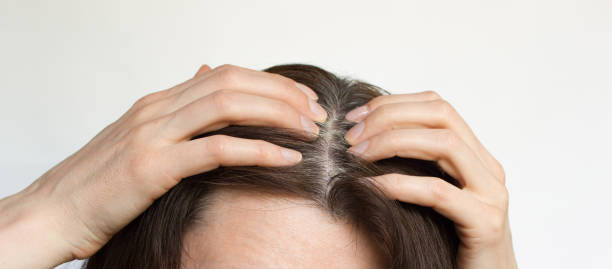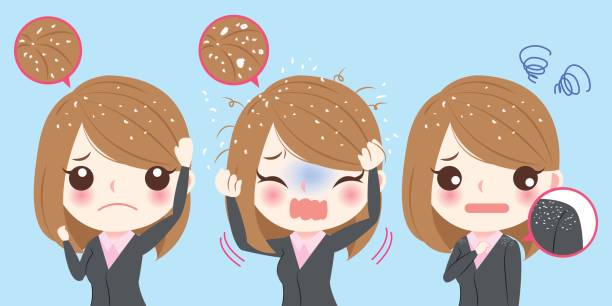Introduction:
An itchy scalp can be both uncomfortable and embarrassing, often leading to scratching, which can exacerbate the issue. Whether caused by dandruff, allergic reactions, or scalp infections, finding relief is crucial. Fortunately, several effective home remedies can soothe an itchy scalp, nourish your hair, and improve overall scalp health. In this article, we will explore natural solutions and tips to help you combat itching, restoring comfort and confidence to your daily routine.

Detailed Descriptions of Home Remedies for Itchy Scalp
1. Coconut Oil and Tea Tree Oil
Coconut oil is a natural moisturizer that can hydrate the scalp, while tea tree oil has antifungal and antibacterial properties. Together, they create a powerful remedy for an itchy scalp.
How to Use:
- Mix 2 tablespoons of coconut oil with 5 drops of tea tree oil.
- Warm the mixture slightly and massage it into your scalp.
- Leave it on for 30 minutes before washing it out with a mild shampoo.
Benefits: This combination soothes irritation, reduces inflammation, and helps eliminate dandruff-causing fungi.
2. Aloe Vera Gel
Aloe vera is known for its cooling and healing properties, making it ideal for soothing an itchy scalp.
How to Use:
- Extract fresh aloe vera gel from the leaf or use store-bought pure aloe vera gel.
- Apply the gel directly to your scalp.
- Leave it on for 20-30 minutes before rinsing it off with lukewarm water.
Benefits: Aloe vera provides instant relief from itching, moisturizes the scalp, and promotes healing of any minor irritations.
3. Apple Cider Vinegar
Apple cider vinegar has natural antibacterial and antifungal properties that can help restore the scalp’s pH balance, reducing itchiness.
How to Use:
- Mix equal parts apple cider vinegar and water in a spray bottle.
- Spray the mixture onto your scalp and let it sit for 15 minutes.
- Rinse thoroughly with water.
Benefits: This remedy helps to reduce scalp buildup, eliminate dandruff, and soothe irritation.
4. Baking Soda
Baking soda is a mild exfoliant that can help remove dead skin cells and relieve itchiness caused by scalp buildup.
How to Use:
- Mix 2 tablespoons of baking soda with enough water to form a paste.
- Apply the paste to your damp scalp and gently massage.
- Leave it on for 10-15 minutes before rinsing it off with cool water.
Benefits: Baking soda helps to exfoliate the scalp, reduce dandruff, and alleviate itching.
5. Peppermint Oil
Peppermint oil has a cooling effect and can help soothe an itchy scalp while promoting blood circulation.
How to Use:
- Dilute a few drops of peppermint oil in a carrier oil, such as olive or coconut oil.
- Massage the mixture into your scalp.
- Leave it on for 20 minutes before washing your hair.
Benefits: Peppermint oil relieves itching, stimulates hair growth, and leaves the scalp feeling refreshed.
Fast Facts About Itchy Scalp
- Fact 1: An itchy scalp can be caused by various factors, including dandruff, fungal infections, and allergic reactions.
- Fact 2: Regular scalp hygiene, including washing with a gentle shampoo, can help prevent itching.
- Fact 3: Natural remedies like coconut oil, aloe vera, and apple cider vinegar are effective for soothing an itchy scalp.
- Fact 4: Stress and poor diet can contribute to scalp irritation and should be managed for overall scalp health.
FAQs About Itchy Scalp
Q1: Can an itchy scalp lead to hair loss?
A1: Yes, excessive scratching due to an itchy scalp can damage hair follicles, leading to hair loss over time. Treating the underlying cause of the itchiness is crucial to prevent this.
Q2: How often should I use home remedies for an itchy scalp?
A2: Most home remedies can be used 2-3 times a week, depending on the severity of the itchiness. It’s important to monitor your scalp’s reaction and adjust the frequency accordingly.
Q3: Is it safe to leave coconut oil on my scalp overnight?
A3: Yes, leaving coconut oil on your scalp overnight can provide deep hydration. However, if you have sensitive skin, it’s advisable to test the oil on a small area first.
Q4: Can an itchy scalp be a sign of a serious condition?
A4: In some cases, an itchy scalp may indicate a more serious condition, such as psoriasis or a scalp infection. If the itching persists despite home remedies, it’s recommended to consult a healthcare professional.
Q5: Are there any side effects to using apple cider vinegar on the scalp?
A5: Apple cider vinegar is generally safe for most people, but it should always be diluted. Undiluted vinegar can cause scalp irritation or a burning sensation, especially if you have sensitive skin.
This comprehensive guide provides natural solutions for an itchy scalp, helping you achieve relief and maintain a healthy scalp environment.



